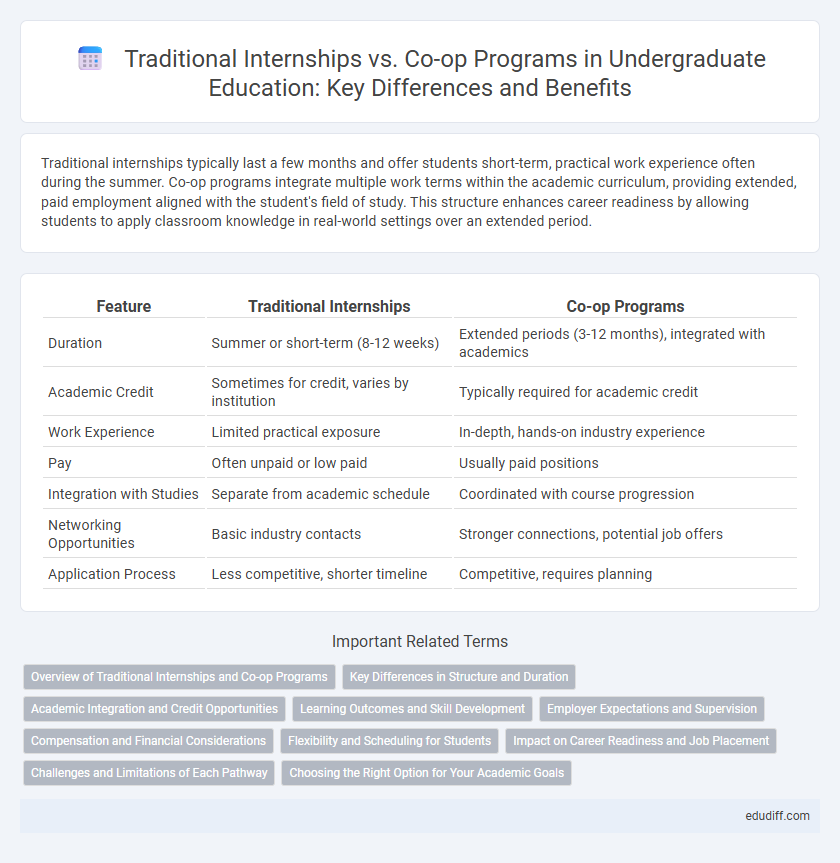Traditional internships typically last a few months and offer students short-term, practical work experience often during the summer. Co-op programs integrate multiple work terms within the academic curriculum, providing extended, paid employment aligned with the student's field of study. This structure enhances career readiness by allowing students to apply classroom knowledge in real-world settings over an extended period.
Table of Comparison
| Feature | Traditional Internships | Co-op Programs |
|---|---|---|
| Duration | Summer or short-term (8-12 weeks) | Extended periods (3-12 months), integrated with academics |
| Academic Credit | Sometimes for credit, varies by institution | Typically required for academic credit |
| Work Experience | Limited practical exposure | In-depth, hands-on industry experience |
| Pay | Often unpaid or low paid | Usually paid positions |
| Integration with Studies | Separate from academic schedule | Coordinated with course progression |
| Networking Opportunities | Basic industry contacts | Stronger connections, potential job offers |
| Application Process | Less competitive, shorter timeline | Competitive, requires planning |
Overview of Traditional Internships and Co-op Programs
Traditional internships typically offer short-term, often summer-based work experiences designed to provide practical exposure in a specific field, lasting from a few weeks to a few months. Co-op programs integrate extended work placements directly into the academic curriculum, alternating semesters of classroom study with full-time employment, usually spanning multiple terms and offering deeper industry immersion. Both pathways enhance professional skills and resume value, but co-op programs generally provide sustained, paid work experiences and stronger connections with employers.
Key Differences in Structure and Duration
Traditional internships typically last a few months during summer or a single semester, offering short-term, immersive work experiences without academic credit requirements. Co-op programs extend over multiple semesters, integrating paid, full-time employment directly related to a student's major with academic coursework, often resulting in academic credit. The structured rotation of co-ops provides extensive professional development and a deeper understanding of industry practices, whereas internships emphasize skill-building within limited timeframes.
Academic Integration and Credit Opportunities
Traditional internships typically offer limited academic integration and may not always provide academic credit, focusing primarily on practical work experience. Co-op programs are designed to integrate classroom learning with full-time work terms, often structured to earn academic credit that contributes directly to undergraduate degree requirements. Students in co-op programs benefit from a seamless blend of theoretical knowledge and hands-on application, enhancing both academic achievement and professional skills.
Learning Outcomes and Skill Development
Traditional internships offer short-term, often project-based experiences that provide foundational exposure to workplace environments and basic professional skills. Co-op programs integrate multiple work terms throughout the academic curriculum, allowing students to develop advanced technical competencies and real-world problem-solving abilities over an extended period. These structured, immersive experiences in co-op programs result in stronger learning outcomes and greater skill development compared to traditional internships.
Employer Expectations and Supervision
Employers expect traditional internships to provide students with short-term, task-oriented experiences requiring minimal supervision, often emphasizing observational learning and basic skill application. Co-op programs demand deeper engagement, with employers anticipating consistent productivity, advanced responsibilities, and close supervision to ensure meaningful contribution over extended periods. The differing supervision levels influence how students develop professional competencies, with co-op participants typically receiving more structured mentorship and performance feedback.
Compensation and Financial Considerations
Co-op programs typically offer paid work terms that provide substantial financial support to undergraduates, often covering tuition fees and living expenses, unlike traditional internships which may be unpaid or offer minimal compensation. The structured nature of co-op jobs usually includes consistent wages and benefits aligned with industry standards, enhancing financial stability throughout the academic program. Financially, co-op students gain a competitive advantage by earning income while accumulating relevant work experience, reducing reliance on student loans compared to peers engaged in traditional internships.
Flexibility and Scheduling for Students
Traditional internships typically offer fixed durations, often limited to summer months, which may restrict students' availability for part-time work during semesters. Co-op programs provide alternating work and study terms, granting greater flexibility by integrating paid employment with academic schedules. This structure supports continuous income and hands-on experience while accommodating diverse course loads and personal commitments.
Impact on Career Readiness and Job Placement
Traditional internships provide undergraduate students with short-term, often summer-based industry exposure that helps develop foundational skills and resume experience. Co-op programs integrate multiple paid work terms throughout the academic schedule, offering deeper practical experience and stronger professional networks. Research shows co-op participants have higher job placement rates and report greater career readiness due to extended industry engagement and skill application.
Challenges and Limitations of Each Pathway
Traditional internships often face limitations such as short duration, which restricts deep skill development and meaningful project involvement for undergraduates. Co-op programs, while offering extended work terms and integrated work-study schedules, pose challenges in balancing academic demands with consecutive work placements, potentially extending the time to degree completion. Both pathways may also encounter variability in quality and mentorship, impacting the overall experiential learning outcomes for students.
Choosing the Right Option for Your Academic Goals
Traditional internships typically offer short-term, project-based experiences that enhance specific skills within a semester, while co-op programs provide extended, paid work terms integrated into academic curricula, allowing deeper industry immersion. Selecting the right option depends on your academic goals: choose internships if you seek flexibility and diverse exposure across multiple industries, and co-op programs if you aim for long-term professional development with a structured work-study balance. Understanding program duration, compensation, and alignment with your field of study ensures an informed decision that supports career readiness and skill application.
Traditional Internships vs Co-op Programs Infographic

 edudiff.com
edudiff.com